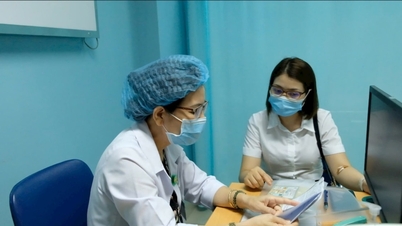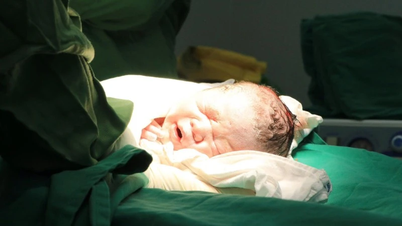I went to the doctor and found a small lump in my neck. I am waiting for the biopsy results to see if it is benign or malignant. Now my neck is painful and slightly swollen. Will the biopsy cause the cancer to spread? (Hoang Ha, Long An )
Reply:
Thyroid biopsy is a technique of taking a sample of thyroid cells with a small needle for cytological tests, helping to determine whether the tumor is benign or malignant. From there, the doctor has an appropriate treatment plan for the patient.
Thyroid cases that are often indicated for biopsy include thyroid tumors with TIRADS levels 4, 5 and sometimes TIRADS 3 (if the patient is very worried about the tumor). Biopsy can also be performed during surgery to remove tissue for pathology, helping the doctor diagnose benign and malignant tumors and assess the status of lymph node metastasis.
There are two types of biopsies: fine needle aspiration cytology (FNAC) and core biopsy.
Fine needle aspiration is common and minimally invasive. The doctor uses a small needle to insert into the tumor or lymph node in the neck under the guidance of ultrasound. The collected cell sample is sent to the pathology laboratory. In case the fine needle aspiration does not produce results, the doctor of the Head and Neck Unit will order the patient to perform a core needle biopsy.
With core needle biopsy (less commonly used in the thyroid due to the increased risk), the doctor uses a larger needle to obtain a sample of cells. Obtaining more tissue gives the pathologist more data for testing, resulting in more accurate results than with fine needle aspiration.
Before the biopsy, whether it is a fine needle aspiration or core needle, the doctor will re-evaluate the thyroid nodule with an ultrasound. The biopsy takes about 15-30 minutes, and the patient does not need anesthesia. After the biopsy, the patient may experience bruising and swelling in the neck area. These conditions disappear after a few days.
A biopsy does not cause thyroid cancer to spread, unless the diagnosis and assessment process is incorrect in the nature of the malignant tumor, causing the patient to not receive timely treatment. The cancer remains in the thyroid, leading to invasion and metastasis to the lymph nodes, lungs, brain...
If infection is not controlled well, biopsies can also cause infection. Bacteria on the skin will follow the biopsy needle into the body, but this is rare. In addition, the patient may also experience bleeding. Some patients with bleeding disorders or on anticoagulant treatment should be carefully counseled before performing a biopsy.
Inexperienced biopsy surgeons can cause damage to the tissues surrounding the thyroid gland. Today, highly skilled and experienced surgeons combined with modern ultrasound machines help reduce this damage.
If your neck pain lasts longer than a week without improvement, you should see your doctor for a more thorough checkup.
Master, Doctor, Specialist II Doan Minh Trong
Head and Neck Unit, Tam Anh General Hospital, Ho Chi Minh City
| Readers ask questions about cancer here for doctors to answer |
Source link


![[Photo] Panorama of the cable-stayed bridge, the final bottleneck of the Ben Luc-Long Thanh expressway](https://vphoto.vietnam.vn/thumb/1200x675/vietnam/resource/IMAGE/2025/9/30/391fdf21025541d6b2f092e49a17243f)
![[Photo] General Secretary To Lam, Secretary of the Central Military Commission attends the 12th Party Congress of the Army](https://vphoto.vietnam.vn/thumb/1200x675/vietnam/resource/IMAGE/2025/9/30/9b63aaa37ddb472ead84e3870a8ae825)
![[Photo] Solemn opening of the 12th Military Party Congress for the 2025-2030 term](https://vphoto.vietnam.vn/thumb/1200x675/vietnam/resource/IMAGE/2025/9/30/2cd383b3130d41a1a4b5ace0d5eb989d)

![[Photo] The 1st Congress of Phu Tho Provincial Party Committee, term 2025-2030](https://vphoto.vietnam.vn/thumb/1200x675/vietnam/resource/IMAGE/2025/9/30/1507da06216649bba8a1ce6251816820)
![[Photo] President Luong Cuong receives President of the Cuban National Assembly Esteban Lazo Hernandez](https://vphoto.vietnam.vn/thumb/1200x675/vietnam/resource/IMAGE/2025/9/30/4d38932911c24f6ea1936252bd5427fa)
































































































Comment (0)